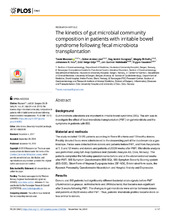| dc.contributor.author | Mazzawi, Tarek | en_US |
| dc.contributor.author | Lied, Gülen Arslan | en_US |
| dc.contributor.author | Sangnes, Dag André | en_US |
| dc.contributor.author | El-Salhy, Magdy | en_US |
| dc.contributor.author | Hov, Johannes Espolin Roksund | en_US |
| dc.contributor.author | Gilja, Odd Helge | en_US |
| dc.contributor.author | Hatlebakk, Jan Gunnar | en_US |
| dc.contributor.author | Hausken, Trygve | en_US |
| dc.date.accessioned | 2019-04-12T13:07:56Z | |
| dc.date.available | 2019-04-12T13:07:56Z | |
| dc.date.issued | 2018-11-14 | |
| dc.Published | Mazzawi T, Lied G, Sangnes DA, El-Salhy M, Hov JR, Gilja OH, Hatlebakk JG, Hausken T. The kinetics of gut microbial community composition in patients with irritable bowel syndrome following fecal microbiota transplantation. PLoS ONE. 2018;13(11):e0194904 | eng |
| dc.identifier.issn | 1932-6203 | |
| dc.identifier.uri | https://hdl.handle.net/1956/19327 | |
| dc.description.abstract | Background: Gut microbiota alterations are important in irritable bowel syndrome (IBS). The aim was to investigate the effect of fecal microbiota transplantation (FMT) on gut microbiota and the symptoms in patients with IBS. Material and methods: The study included 13 IBS patients according to Rome III criteria and 13 healthy donors. Freshly donated feces were administered to the descending part of the duodenum via a gastroscope. Feces were collected from donors and patients before FMT, and from the patients at 1, 3 and 12 weeks and donors and patients at 20/28 weeks after FMT. Microbiota analysis was performed using GA-map Dysbiosis test (Genetic Analysis AS, Oslo, Norway). The patients completed the following questionnaires before and at the aforementioned weeks after FMT: IBS Symptom Questionnaire (IBS-SQ), IBS-Symptom Severity Scoring system (IBS-SSS), Short Form of Nepean Dyspepsia Index (SF-NDI), Bristol stool form scale, the Eysenck Personality Questionnaire-Neuroticism and Hospital Anxiety and Depression. Results: Donors and IBS patients had significantly different bacterial strain signals before FMT (Ruminococcus gnavus, Actinobacteria and Bifidobacteria) that became non-significant after 3 weeks following FMT. The changes in gut microbiota were similar between donors and patients at 20/28 weeks after FMT. Thus, patients’ microbiota profiles became more-or-less similar to donors. The scores of all the questionnaires were significantly improved at all time points following FMT. No reported adverse effects. Conclusions: FMT was associated with a change in gut microbiota and improvement in IBS symptoms and quality of life lasting for up to 28 weeks. | en_US |
| dc.language.iso | eng | eng |
| dc.publisher | PLOS | eng |
| dc.rights | Attribution CC BY | eng |
| dc.rights.uri | http://creativecommons.org/licenses/by/4.0/ | eng |
| dc.title | The kinetics of gut microbial community composition in patients with irritable bowel syndrome following fecal microbiota transplantation | en_US |
| dc.type | Peer reviewed | |
| dc.type | Journal article | |
| dc.date.updated | 2018-12-05T06:37:09Z | |
| dc.description.version | publishedVersion | en_US |
| dc.rights.holder | Copyright 2018 The Author(s) | |
| dc.identifier.doi | https://doi.org/10.1371/journal.pone.0194904 | |
| dc.identifier.cristin | 1637338 | |
| dc.source.journal | PLoS ONE | |

